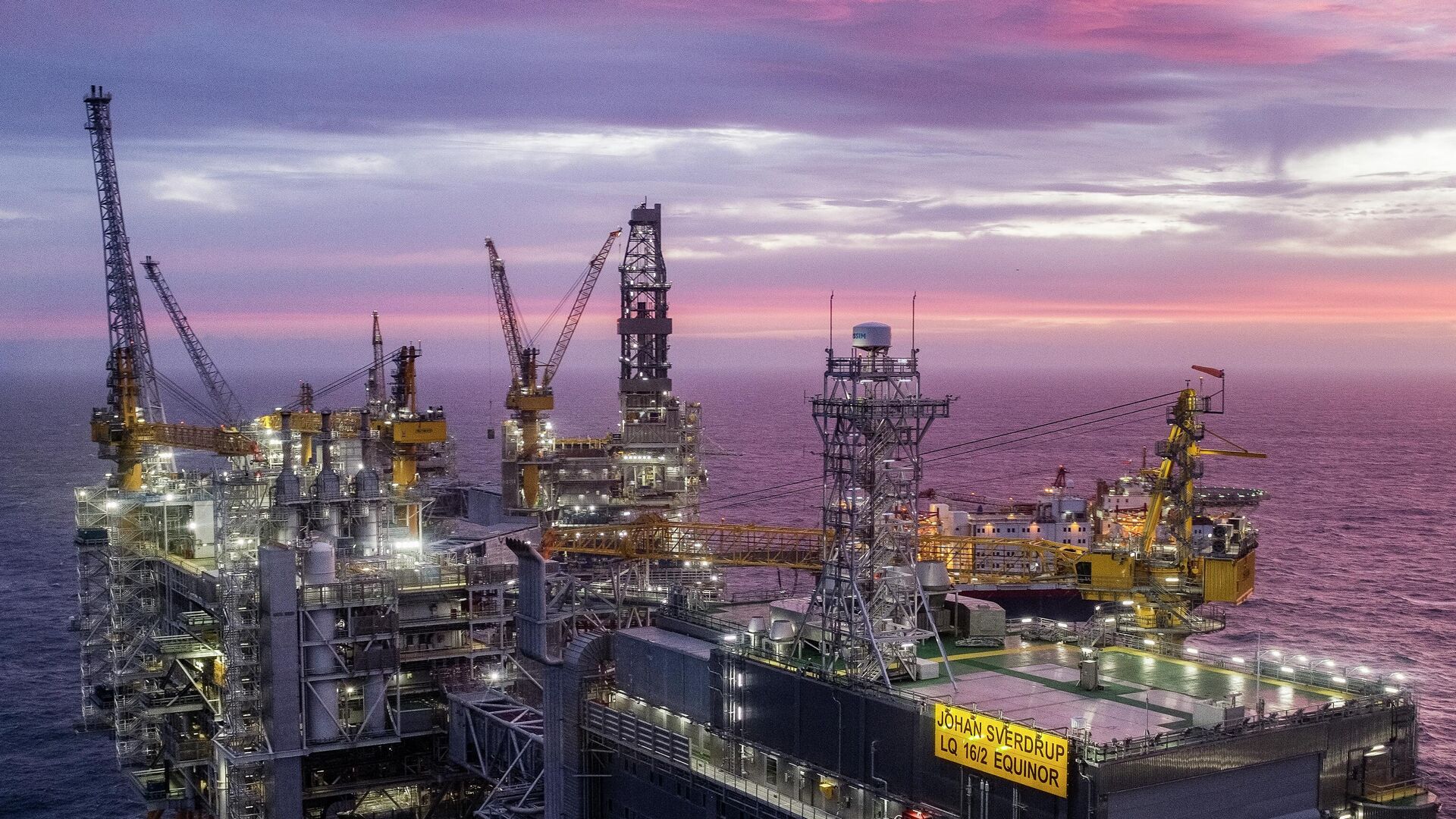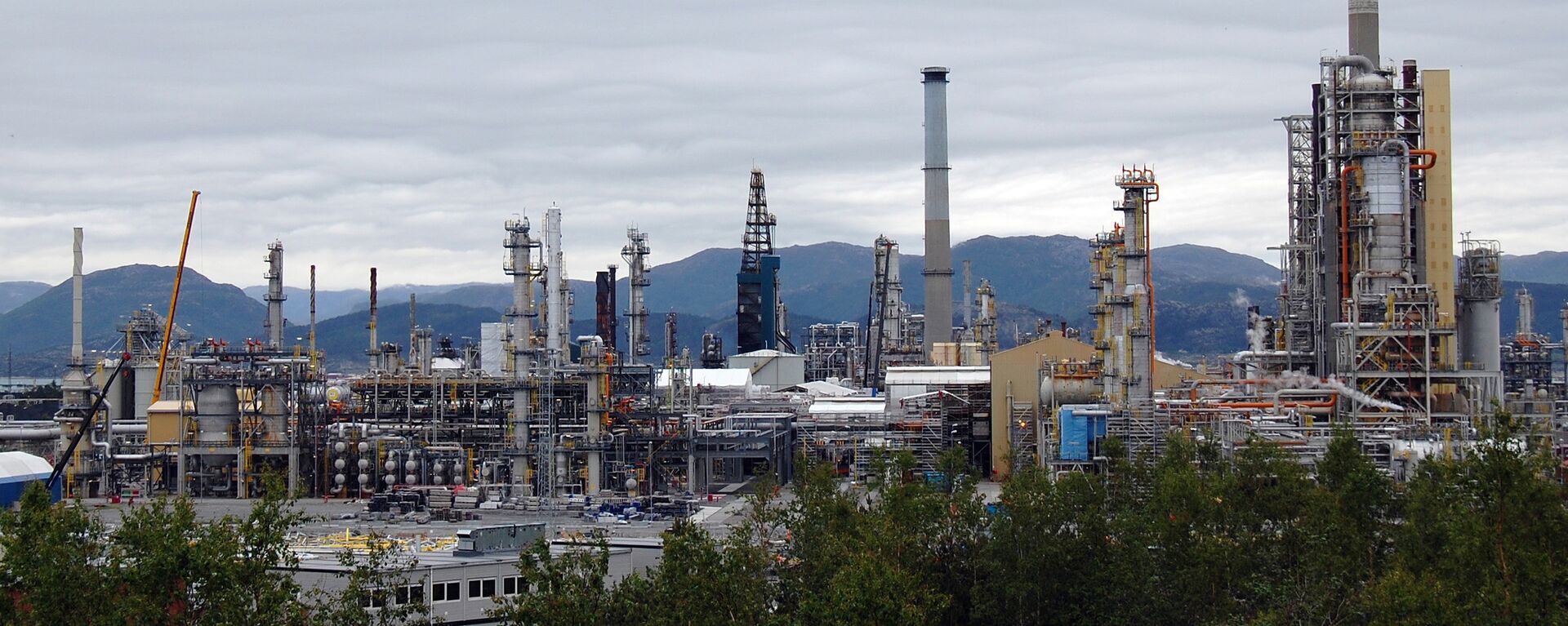https://sputnikglobe.com/20220706/unjustifiable-norwegian-government-intervenes-to-stop-oil-and-gas-workers-strike-1096999550.html
'Unjustifiable': Norwegian Government Intervenes to Stop Oil and Gas Workers Strike
'Unjustifiable': Norwegian Government Intervenes to Stop Oil and Gas Workers Strike
Sputnik International
In the worst case scenario, the planned escalation of the strike launched by Norwegian offshore oil and gas workers on Tuesday would have left European... 06.07.2022, Sputnik International
2022-07-06T05:29+0000
2022-07-06T05:29+0000
2022-07-06T05:29+0000
scandinavia
newsfeed
norway
oil and gas
strike
https://cdn1.img.sputnikglobe.com/img/07e6/07/05/1096986615_0:0:3073:1728_1920x0_80_0_0_357f2ba9cc0976562610c52f10261ef6.jpg
The Norwegian government has intervened to end a strike in the petroleum sector that had cut the nation's oil and gas output, the Labour Ministry said. The forcible solution ended a possible stalemate that would have worsened Europe's energy pinch further.Mjøs Persen emphasized Norway's “vital role” in supplying gas to Europe, which is why the planned escalation would have had serious consequences, for the UK, Germany and other nations, forcing the government to exercise its right to intervene. Such powers have been previously used to end petroleum sector strikes, in order to protect Norway's reputation as a reliable gas supplier to Europe.Lederne union leader Audun Ingvartsen stated that workers are going back to work “as soon as possible”.Norwegian offshore oil and gas workers went on strike over wages on Tuesday. A planned escalation of the industrial action would have endangered the country's exports and exacerbated supply shortages to Europe over sanctions war and the Ukrainian conflict.Should the escalation continued, by Saturday the strike would have slashed daily gas exports by over 1,110,000 barrels of oil equivalent, or 56 percent of daily gas exports, while over 340,000 of barrels of oil, or over 17 percent of the daily output, would have been lost, the Norwegian Oil and Gas (NOG) employers' lobby said. In a worst case scenario, Belgium and the UK would have to fare without Norwegian pipeline gas starting from Saturday.Previously, union members voiced their concern about accelerating inflation eroding their wages, even though they are considered among the best paid among offshore workers. Last week, they turned down a pay rise of up to 4.5 percent, negotiated between union leaders and oil companies. For the sake of comparison, inflation in May stood at 5.7 percent.Under the forced settlement by the government, workers will receive the same terms as the two other oil unions that had negotiated deals with employers, with an independent committee tasked with resolving the details.Oil and gas from Norway, Europe's second-largest energy supplier trailing only Russia, is in high demand given the continent's energy squeeze. As Russia’s shipments have dropped to multiyear lows due to a combination of massive EU sanctions, some European countries' refusal to meet Moscow's demand and pay for Russian energy in rubles, and Brussels' plans to ultimately wipe out energy imports from Russia completely, Norway’s exports are becoming increasingly important for Europe. In 2021, Norway supplied a quarter of gas demand in the EU and the UK and some 8 percent of its oil demand. Recently, Oslo claimed it could replace more Russian gas if Europe assures its demand.
https://sputnikglobe.com/20220523/ukraine-crisis-polish-prime-ministers-claim-oslo-should-share-oil-revenues-causes-stir-in-norway-1095709317.html
scandinavia
norway
Sputnik International
feedback@sputniknews.com
+74956456601
MIA „Rossiya Segodnya“
2022
News
en_EN
Sputnik International
feedback@sputniknews.com
+74956456601
MIA „Rossiya Segodnya“
Sputnik International
feedback@sputniknews.com
+74956456601
MIA „Rossiya Segodnya“
scandinavia, newsfeed, norway, oil and gas, strike
scandinavia, newsfeed, norway, oil and gas, strike
'Unjustifiable': Norwegian Government Intervenes to Stop Oil and Gas Workers Strike
In the worst case scenario, the planned escalation of the strike launched by Norwegian offshore oil and gas workers on Tuesday would have left European nations, such as Belgium and the UK, without Norwegian pipeline gas in a matter of days, starting from Saturday.
The Norwegian government has intervened to end a strike in the petroleum sector that had cut the nation's oil and gas output, the Labour Ministry said. The forcible solution ended a possible stalemate that would have worsened Europe's energy pinch further.
“It is unjustifiable to let gas production be stifled to such an extent”, Labor Minister Marte Mjøs Persen
told national broadcaster NRK. In particular, the ongoing energy crisis and the conflict in Ukraine must be taken into account, she stressed.
Mjøs Persen emphasized Norway's “vital role” in supplying gas to Europe, which is why the planned escalation would have had serious consequences, for the UK, Germany and other nations, forcing the government to exercise its right to intervene. Such powers have been previously used to end petroleum sector strikes, in order to protect Norway's reputation as a reliable gas supplier to Europe.
Lederne union leader Audun Ingvartsen stated that workers are going back to work “as soon as possible”.
Norwegian offshore oil and gas workers went on strike over wages on Tuesday. A planned escalation of the industrial action would have endangered the country's exports and exacerbated supply shortages to Europe over sanctions war and the Ukrainian conflict.
Should the escalation continued, by Saturday the strike would have slashed daily gas exports by over 1,110,000 barrels of oil equivalent, or 56 percent of daily gas exports, while over 340,000 of barrels of oil, or over 17 percent of the daily output, would have been lost, the Norwegian Oil and Gas (NOG) employers' lobby said. In a worst case scenario, Belgium and the UK would have to fare without Norwegian pipeline gas starting from Saturday.
Previously, union members voiced their concern about accelerating inflation eroding their wages, even though they are considered among the best paid among offshore workers. Last week, they turned down a pay rise of up to 4.5 percent, negotiated between union leaders and oil companies. For the sake of comparison, inflation in May stood at 5.7 percent.
Under the forced settlement by the government, workers will receive the same terms as the two other oil unions that had negotiated deals with employers, with an independent committee tasked with resolving the details.
Oil and gas from Norway, Europe's second-largest energy supplier trailing only Russia, is in high demand given the continent's energy squeeze. As Russia’s shipments have dropped to multiyear lows due to a combination of massive EU sanctions, some European countries' refusal to meet Moscow's demand and pay for Russian energy in rubles, and Brussels' plans to ultimately wipe out energy imports from Russia completely, Norway’s exports are becoming increasingly important for Europe. In 2021, Norway supplied a quarter of gas demand in the EU and the UK and some 8 percent of its oil demand. Recently, Oslo claimed it could replace more Russian gas if Europe assures its demand.


